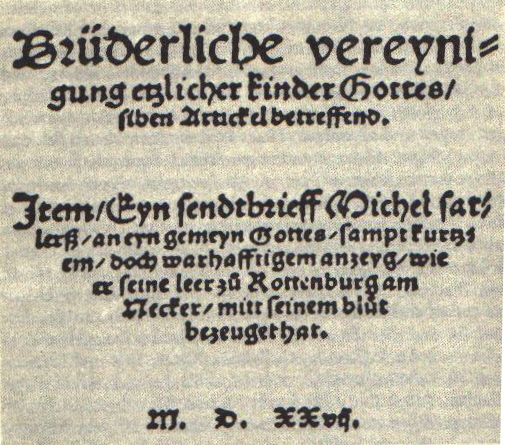MICHAEL SATTLER DEFENDED HIS ANABAPTIST FAITH TO THE END

[Above: Title page of the Schleitheimer Confession (1527), bearing Sattler's name. Originally uploaded by GregorHelms / public domain, Wikimedia File:Titelseite Schleitheimer Artikel.jpg]
RETURNING from an Anabaptist conference in Schleitheim, Switzerland, Michael Sattler walked into a trap. He did not know that Catholic authorities were lying in wait at Horb (on the Neckar River near Rottenburg and Tübingen). He stepped into their arms, captured along with several other Anabaptists.
The captors found a confession of faith on Sattler. Swiss Brethren had drafted this under his leadership. They titled it “Brotherly Agreement of Some Children of God” but we know it as the Schleitheim Confession. It taught Anabaptists to baptize only those who had faith and to ban those who persisted in sin after warnings. They were also to refuse to take oaths or to use weapons, and to regard the Lord’s Supper as a symbol rather than a sacrament.
Knowing that the people of Horb loved and respected Sattler, the Austrians imprisoned him several miles away. From jail he wrote a letter of encouragement to the folk he had led to Christ at Horb. He exhorted them to be faithful, pure, and productive:
Remember the Lord who gave you a coin ... lest that one talent be taken away from you. Place it at interest according to the command of the Lord who entrusted it to you....Persevere in prayer, that you might stand worthily before the Son of Man.
Sattler refused a lawyer. Because the accusations had to do with his faith, he said he must answer them himself. When he asked the council to repeat the charges so he could defend against them, the clerk of Ensisheim, who was taking part in the proceedings, refused. Sattler claimed to have the Holy Spirit, sneered the clerk. Let the Holy Spirit give him the details. Fairer judges overruled the man. However, Ensisheim’s clerk continued his vicious attacks throughout the trial and at the sentencing.
Among the charges against Sattler were that he had left the monastery where he was prior (the highest post below an abbot) and had broken his vows by marrying. Yes, said Sattler. He had seen the wicked lives of the monks who debauched many women, and decided it was best to marry. As for leaving monasticism, he did so after studying the letters of Paul and seeing that Christ’s righteousness, not monastic observance, was the way to salvation.
Near the end of his trial, he asked for Bible experts to examine him. The Ensisheim clerk answered, "Yes, you infamous, desperate rascal of a monk, should we dispute with you? The hangman will dispute with you, I assure you!"
The clerk swayed the court to impose a cruel sentence. Sattler was to burn alive. His tongue was to be cut out first and his flesh torn seven times with red hot pincers. On this day 20 May 1527 (or 21 May) Austrian authorities carried out the sentence on the “archheretic.” He had enough tongue left to preach to onlookers before he was cast into the flame. To complete their work, the judges drowned Sattler’s wife and several other women.
—Dan Graves
----- ----- -----
Michael Sattler's story is told in The Radicals Watch it at RedeemTV
The Radicals can be purchased at Vision Video.







